 W
WThe aqueduct of Querétaro is an 18th-century aqueduct in the Mexican city of Querétaro. It forms a part of the historic center of Querétaro, a UNESCO World Heritage Site. The aqueduct is 1,280 metres (4,200 ft) long. It has 74 arches, which reach an average height of 28.5 m (94 ft).
 W
WThe bust of Bernardino Rivadavia is installed in Cholula, Puebla, Mexico.
 W
WThe bust of Plácido Domingo is installed outside the Teatro Principal in Puebla's historic centre, in the Mexican state of Puebla. The sculpture was unveiled in 2017.
 W
WChrist of the Sacred Heart is a 75-foot-tall (23 m) statue of Jesus displaying his Sacred Heart located above the town of El Morro, six miles south of the city of Rosarito, Baja California, Mexico. The statue is situated directly across the highway from the coastal Las Rocas Resort and Spa, from which an excellent view of the statue can be had.
 W
WThe Glorioso Cristo de Chiapas, also known as the Cristo de Copoya, is a 62-metre (203 ft) tall monumental cross located in the Mexican state of Chiapas. The cross, which features a profile of Jesus Christ in its interior, was designed by Mexican architect Jaime Latapí López. Construction of the Cristo de Chiapas began in 2007 and was completed in December 2011.
 W
WThe Cerro del Cubilete is a 200 metres (660 ft) mountain in Silao Municipality in Guanajuato, Mexico.
 W
WThe monument to Ignacio Zaragoza is installed in Puebla, in the Mexican state of Puebla.
 W
WFaro del Comercio is a monument designed by the accomplished Mexican architect Luis Barragán and constructed in 1984 by architect Raúl Ferrera. It is a recognizable sight in Monterrey among many other modern manmade landmarks, such as Neptune's Fountain, the Monterrey City Hall, the Papal Bridge, and the Bridge of Unity in San Pedro, connecting that municipality to Monterrey. These sites are intended on one hand to complement the city's few remaining traditional landmarks, such as, the Bishopric Palace and Museum, the City's Cathedral, the Central Post Office, and the State of Nuevo León Government building, on the north end of the Macroplaza. On the other hand, they are also intended to project an image of a city that prides itself as being the most progressive large industrial city of Mexico.
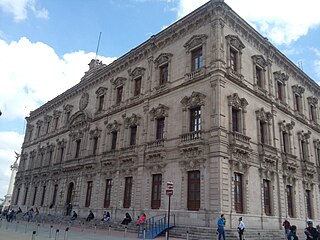 W
WThe Government Palace of Chihuahua is a 19th-century building in the city of Chihuahua, Mexico. Located in the heart of the city, it is of special interest since it houses the executive offices of the governor of the state of Chihuahua and, until 2004, the state legislature met here. The building is a landmark in the city as it contains a shrine commemorating the execution of Miguel Hidalgo, considered the Father of the Country, who died at the hands of a Spanish firing squad on July 30, 1811. The Altar de la Patria, or Altar of the Fatherland is located at the exact spot where Miguel Hidalgo died.
 W
WLa Victoria del Viento is a monument in the city of Pachuca, Mexico, commemorating the bicentenary of the Mexican independence from Spain (1810–2010). Located on the Bicentennial Plaza, the monument was created by Mexican sculptor Bernardo Luis López Artasánchez and consists of 14 individual sculptures.
 W
WThe Monument for the 150th Anniversary of the Battle of Puebla is a public park and memorial designed by Enrique Norten of TEN Arquitectos, located in the city of Puebla, Puebla, Mexico. The project was completed during 2011–2012, and commemorates the 150th anniversary of the Battle of Puebla.
 W
WThe monument to Rafael Cabrera is installed in the city of Puebla, in the Mexican state of Puebla.
 W
WThe Pachuca's Monumental Clock is a clock tower 40 m high, located in Plaza Independencia of the Historic centre of the city of Pachuca, in Hidalgo State, Mexico. Which was built between 1904 and 1910 to commemorate the Centennial of the Independence of Mexico. Its machinery is identical to that of Big Ben in London. The Monumental Clock is the best known symbol and representative of the city.
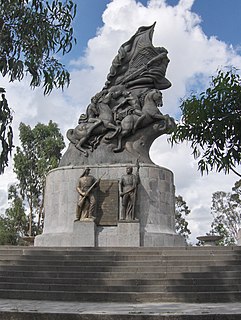 W
WThe Monumento a la Victoria del 5 de Mayo is installed in the city of Puebla, Puebla, Mexico.
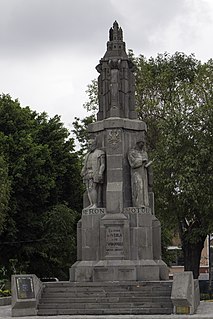 W
WThe Monumento a los Fundadores de Puebla is installed in Puebla, in the Mexican state of Puebla.
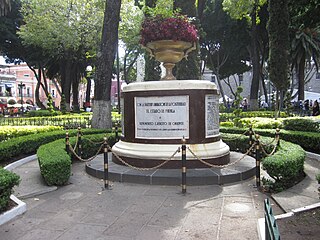 W
WThe Monumento al Sitio de Puebla is a monument in the city of Puebla's Zócalo, in the Mexican state of Puebla.
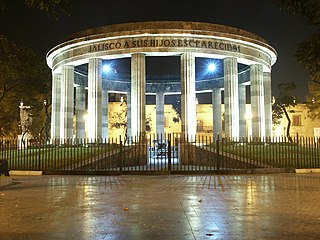 W
WThe Rotonda de los Jaliscienses Ilustres is a landmark of the city of Guadalajara, Jalisco, Mexico, located at the flanked avenues of Fray Antonio Alcalde, Miguel Hidalgo and the streets Liceo and Independencia, in the heart of the capital of the state of Jalisco known as historical centre, by the Cathedral of Guadalajara. It honors the memory of the people of Jalisco that has transcended through history.
 W
WThe statue of Álex Lora is installed in the city of Puebla, in the Mexican state of Puebla.
 W
WThe statue of Alfredo Toxqui Fernández de Lara in Cholula, Puebla, was erected by Gobierno Municipal de Cholula de Rivadavia in 2004.
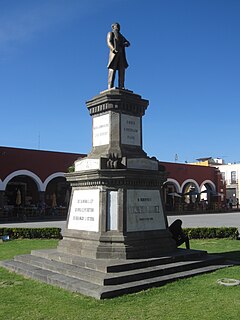 W
WThe statue of Benito Juárez is installed in Cholula, Puebla's Plaza de la Concordia, in Mexico.
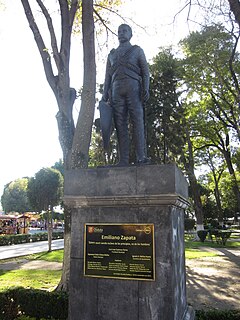 W
WThe statue of Emiliano Zapata in Cholula, Puebla, Mexico, was erected by Gobierno Municipal de San Pedro Cholula in 2014.
 W
WThe statue of Esteban de Antuñano is installed in the city of Puebla, Puebla, Mexico.
 W
WThe statue of Héctor Azar is installed in the city of Puebla's historic centre, in the Mexican state of Puebla.
 W
WThe statue of Miguel Hidalgo y Costilla is installed in Cholula, Puebla's Plaza de la Concordia, in Mexico.